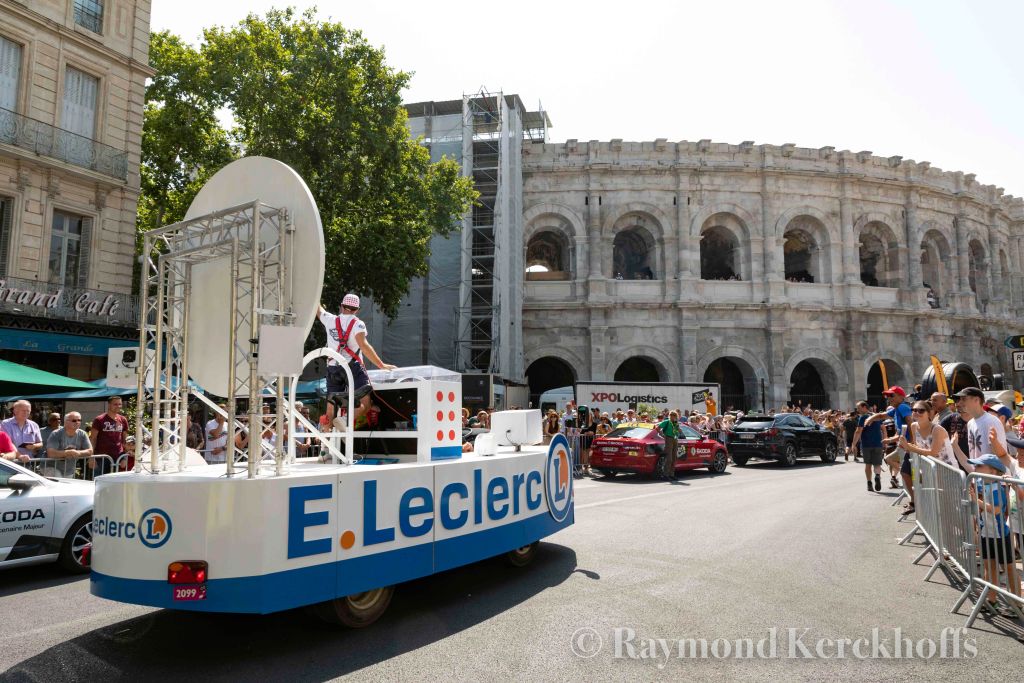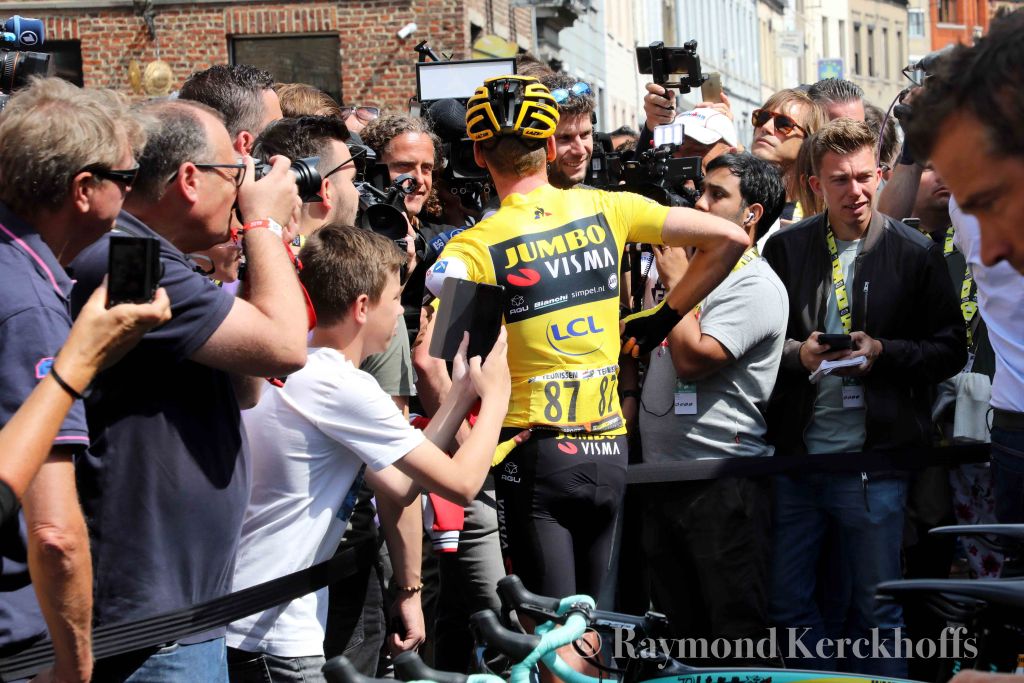
Professor in economics at KU Leuven, Belgium.
Follow his Twitter-account @vrdaam for regular updates on TV audiences for cycling.
The cycling world is now pinning its hope on a Tour de France in September and many more exciting top races in the Fall. But cycling fans deserve a reality check. The chances of the cycling feast going on remain slim and the risks of organizing the event are huge. There are three major risk factors: the large roadside public, the traveling Tour de France village and the habits in the peloton.
The roadside public
Medical experts around the world warn that having sport events with fans amid a pandemic and before there is a vaccine poses extreme health risks. But barring a medical miracle, the process of developing and widely distributing a vaccine is likely to take another year. Any major sports event with a live audience is therefore a potential biological bomb similar to the well-attended Champions League game between Atalanta Bergamo and Valencia in February that was a major cause for the Corona outbreak in Northern Italy. A September Tour de France with roadside public represents no less than 21 potential splinter bombs all over France.

FOTO: RAYMOND KERCKHOFFS
The delay until September seemed to be wise at first. Children will be back to school, the majority of the workforce is back to work and the number of foreign spectators should be small. Yet, it is an illusion to expect that the 12 million annual Tour de France spectators will disappear like ice in the sun, especially if it is going to be one of the few sport events this year where spectators are allowed. Football matches and Formula 1 races are all expected to take place behind closed doors for the rest of the year. Furthermore, eight of the 21 Tour stages are held at the weekend. French citizens will want to celebrate the fact that the nation’s most significant sports event is being held after all, and a high turnout along the Tour de France race route is likely. On top of that, it is unclear how international tourism will develop this year. It is to be expected though that part of the tourism peak will now shift to late summer, especially when European internal borders remain closed a bit longer. Under such circumstances, social distancing on e.g. the many Tour’s mountain passes can hardly be maintained.
The alternative, a Tour de France without any fans in attendance, has been strongly rejected by organizer ASO because “that wouldn’t feel like a Tour de France”. It would also be difficult to enforce and it would imply renewed local confinements. One has also to take into account that about twenty-five cities have paid significant fees for the right to host a Tour start or finish. Although ASO will not be keen to keep the public away from the start and arrival zones in these cities, it is the least we can expect as a security measure to reduce large public gatherings, even if this implies that host cities will demand a financial compensation.
The traveling Tour de France village
Under normal circumstances, the Tour de France represents a vast operation with 4000 people on the move daily, going from one hotel to another for three weeks in a row. Consequently, whoever carries the virus becomes a potential super spreader of the virus across the whole of France. When the Tour wants to act socially responsible, it will need to test everyone of them, not only before the start, but also regularly throughout the entire Tour.

FOTO: RAYMOND KERCKHOFFS
The Tour de France village can, of course, be made much smaller. For a start, cancelling the publicity caravan makes a big difference while at the same time its helps reducing the number of roadside spectators. It remains to see, however, if ASO wants to forsake such an important source of income for more security. Most of the journalists can stay at home as well. TV commentators can comment from the well equipped studios in the broadcasting houses in their home country and the writing press can work at home. Riders will have to avoid all contact with the outside world anyway, and interviews will probably be conducted via other (social media) channels. But even a Tour de France village half the usual size still remains a massive and risky daily migration of people.
The peloton
Sports that are considering a restart soon all acknowledge a fourteen-day quarantine of the athletes, team staff, officials and the media is quintessential before any competitions can resume. The Australian Rugby League wants to isolate teams on an island and the Premier League plans to play up to four games a week in an empty Wembley stadium. Teams, officials and all persons necessary for media coverage of the football games are supposed to stay in quarantined hotels nearby and no outside contacts would be allowed.
It appears that cycling doesn’t feel such measures of isolation are necessary. On the contrary: the idea to schedule the national road cycling championships a week before the Tour is a capital blunder. As a result, just a few days before Le Grand Départ, riders will fly in from about 30 countries around the world. While German football clubs are already testing their players every other day without any games having been played, in Nice 176 riders will gather without any prior isolation, with all the health risks this entails. Really?
But also once the Tour de France gets underway will the risks of contamination be extremely high, because in cycling there is poor hygiene. The caution to avoid illness that riders display in their daily lives is in stark contrast with their behavior during a cycling race. Anyone who ever rode in a cycling peloton knows that inevitably you get covered by sweat, snot and other unappetizing body fluids from fellow riders. Therefore, all riders should be tested daily, as well as all other team members, from managers to mechanics. But this will be difficult to achieve from a practical point of view and it is going to be costly. Can this be imposed on cycling teams and who will pay for the extra costs? And there is much more to consider. Will every rider with a nasty cough be withdrawn from the race? Will teams be allowed to decide on this by themselves or will there be some sort of external health check on a daily basis? Will riders keep sharing rooms with each other? Can domestiques still collect water bottles for the team leaders?

FOTO: RAYMOND KERCKHOFFS
Virologists expect a second wave in the fall while group immunity is growing at a much slower pace than expected. The virus will be around for months to come. Consequently, there is a genuine risk of a rider or staff member from a team testing Covid-positive during the course of the Tour de France. What will happen if this occurs? Will the whole team have to abandon the Tour? Or all teams that stayed in the same hotel? Or would it be the end of the Tour? No one wants to relive what happened in February in the United Arab Emirates Tour, so ASO better has some worst case scenario’s ready.
Devi Sridhar, one of the world’s most renowned pandemic virologists, calls a Tour in 2020 “a recipe for disaster”. What about ASO’s social responsibility when it fails to prevent a new Corona outbreak in France? The question therefore is whether or not ASO and the cycling teams are prepared to make substantial financial sacrifices to really guarantee not only the riders’ but also society’s safety by isolating and testing everyone from preferably two weeks before the start of the Tour until the finish in Paris. The underlying question is whether or not it is worthwhile to organise a Tour under dark Corona-clouds, risking another Tour of shame, just like in 1998.
A year without a Tour is a financial setback for cycling, but a Corona-Tour can destroy its most prestigious event. That is the catch-22 position in which ASO now finds itself. But perhaps this will all become irrelevant if in August a corona infection occurs in one of the many cycling races that are already lobbying for a status of a – probably very well covered – Tour warm-up race. If this happens, the 2020 cycling season will really be over.


What a risk, eventuely if TdF 2020 will be organised as well as all the main- classics. Who will take it? Only do it when worldwide all the specialists give “green light”!